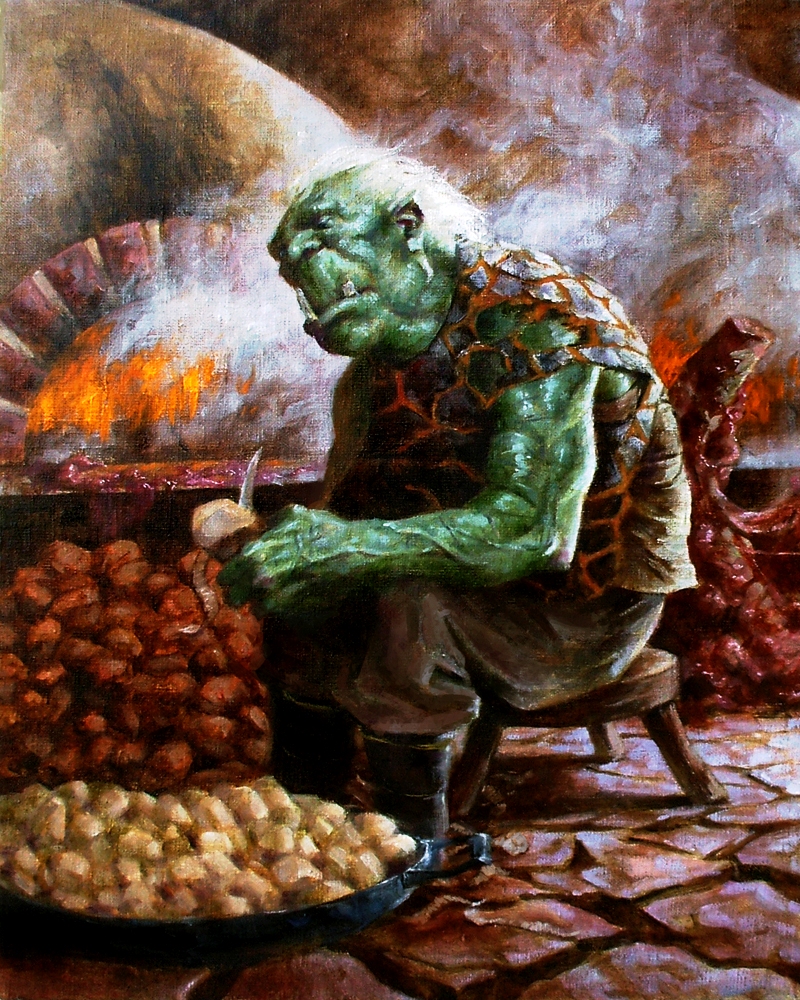Difference between revisions of "Cooking (sage ability)"
Tao alexis (talk | contribs) |
Tao alexis (talk | contribs) |
||
| Line 1: | Line 1: | ||
[[File:Cooking (sage ability).jpg|right|490px|thumb]] | [[File:Cooking (sage ability).jpg|right|490px|thumb]] | ||
| − | + | '''Cooking''' is an amateur-status sage ability that enables the character to prepare superior [[Food|food]] for consumption. There is additional skill in making dishes that are more healthy and palatable, translating to an increase in the taste, which other characters will enjoy. The limitations upon cooking depend upon the food's quality and the manner of its preparation. | |
| − | + | '''Food quality''' is a measure of the consumable's durability and appetising qualities. "Durables" are preserved, strong-tasting foods that also happen to be rough on the palate. "Staples" are everyday stored foods, making up the largest part of the diet. "Fresh" foods are found only in certain seasons and have a pleasant, distinct flavour. "Selective" foods are rare, high quality and transient in nature. "Premium" foods include items of the greatest distinction; often, premium foods are difficult to eat for those without a trained palate. | |
| − | + | '''Preparation''' describes the circumstances in which the food is made. "Cold Camp" fare describes the preparation of food without a fire. "Campfire" fare is cooking over an open fire, with the attendant odours and limitations that entails. "Galley" fare is made in a cramped kitchen of limited resources, such as in a cookwagon or aboard ship. "Scullery" fare describes a room home kitchen, with small fireplace and chimney. "Guestkitchen" fare is prepared in a spacious, clean environment with many servants, fresh water and excellent preparation, similar to an inn or tavern. "Lord's Kitchen" fare is made in a vast stone building, with room for smoke houses, drying, continuous fires and time for long-term preparation, such as a squire or noble would possess. | |
| − | |||
| − | |||
| − | |||
| − | |||
| − | [[ | + | The combination of these factors contribute to the food's taste and [[Nutrition & Preparation of Food|nutritional]] value, as well as the nature of the diner's response. A cook is able to cook any sort of food in any sort of environment, but it's rare that an ordinary amateur cook would have access to the better places of preparation. |
| + | |||
| + | |||
| + | See [[Gastronomy (sage study)]]<br> | ||
Revision as of 18:29, 10 May 2022
Cooking is an amateur-status sage ability that enables the character to prepare superior food for consumption. There is additional skill in making dishes that are more healthy and palatable, translating to an increase in the taste, which other characters will enjoy. The limitations upon cooking depend upon the food's quality and the manner of its preparation.
Food quality is a measure of the consumable's durability and appetising qualities. "Durables" are preserved, strong-tasting foods that also happen to be rough on the palate. "Staples" are everyday stored foods, making up the largest part of the diet. "Fresh" foods are found only in certain seasons and have a pleasant, distinct flavour. "Selective" foods are rare, high quality and transient in nature. "Premium" foods include items of the greatest distinction; often, premium foods are difficult to eat for those without a trained palate.
Preparation describes the circumstances in which the food is made. "Cold Camp" fare describes the preparation of food without a fire. "Campfire" fare is cooking over an open fire, with the attendant odours and limitations that entails. "Galley" fare is made in a cramped kitchen of limited resources, such as in a cookwagon or aboard ship. "Scullery" fare describes a room home kitchen, with small fireplace and chimney. "Guestkitchen" fare is prepared in a spacious, clean environment with many servants, fresh water and excellent preparation, similar to an inn or tavern. "Lord's Kitchen" fare is made in a vast stone building, with room for smoke houses, drying, continuous fires and time for long-term preparation, such as a squire or noble would possess.
The combination of these factors contribute to the food's taste and nutritional value, as well as the nature of the diner's response. A cook is able to cook any sort of food in any sort of environment, but it's rare that an ordinary amateur cook would have access to the better places of preparation.
